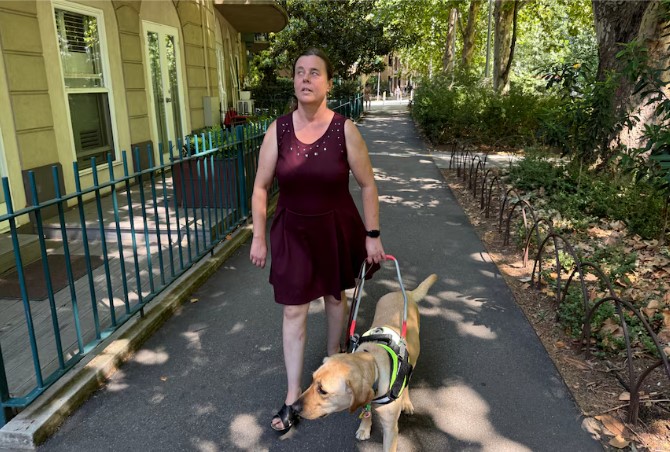Woman with disability takes Uber to Federal Court over repeated refusals
February 21, 2025

A Victorian woman with disability claims she was denied service by rideshare giant Uber an astonishing 32 times in less than two years – simply because of her guide dog. Now, she’s calling on people with disability across the country to unite and push for change.
Paula Hobley, who has been legally blind since birth and relies on rideshare services to get around, is filing a lawsuit in the Federal Court, arguing that Uber drivers violated disability discrimination laws.
She also believes government intervention is necessary to ensure that discrimination is stamped out.
“It’s made me extremely frustrated and angry,” Hobley told Yahoo. “And it’s limited the things that I do because I weigh up the costs of the stress of the refusals, against the benefit of doing the activity.
“It means there are times I don’t attend appointments that I would benefit from.”
When she lodged complaints with Uber, Hobley was offered $35 in compensation – a response she found inadequate.
“Uber often provided me with $35 of Uber cash per cancellation – sometimes there were more than one cancellation on a day – and only sometimes they refunded me,” Hobley said.
She also shared that some drivers outright cancelled her trips, while others messaged her requesting she book Uber Pet, a service that comes with extra fees.
“My service dog is not a pet. She has a right to access public places and services,” Hobley said.
Now, she’s encouraging other Australians with disability who have faced similar challenges to speak out and take action.
“If this is happening to me, it’s happening to people with other kinds of assistance dogs too,” Hobley said. “It shouldn’t be up to people with disability to have to make complaints after they are discriminated against.
“There is power in making complaints. If we band together and make complaints it sends a clear message to government and companies like Uber that this behaviour is unacceptable and won’t be tolerated.”
When approached for comment, Uber Australia acknowledged the seriousness of the issue.
“We have strong policies, tools and driver education modules in place to ensure drivers understand their legal obligation to provide service to riders with assistance animals,” a spokesperson said.
Do you have a similar story and want to speak out? Contact federal and state representatives to push for stronger policies and protections against disability discrimination. Organisations such as Disability Advocacy Network Australia or Vision Australia can provide support in filing complaints and seeking legal advice.




